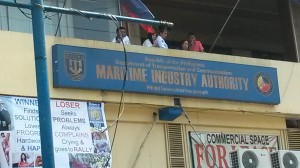Marina to encourage more women sailors
MANILA, Philippines—With its “She to Sea” program, the Maritime Industry Authority (Marina) is urging Filipino women to pursue careers in the male-dominated shipping sector.
Of the 810,481 seaman’s books issued during the past four years by the Department of Transportation and Communications-attached agency, a total of 47,038 were released to women, according to Marina deputy administrator for planning Nicasio Conti.
Metro Manila topped the list of female recipients of the travel document with 12,450, followed by Bulacan with 1,863; Iloilo, 1,842; Batangas, 1,439; Cebu, 1,396; Cavite, 1,365; Pampanga, 1,364; and Pangasinan, 1,311, according to a copy of the Marina report that Conti furnished the Inquirer.
Seaman’s books were also issued to female applicants from Tawi-Tawi (12), Camiguin (16), Sulu (26), Lanao del Sur (31), Basilan and Quirino (both 40), Siquijor (45), Ifugao (47), Isabela (55), Abra (58), Batanes (72) and Catanduanes (97).
Seaman’s books
Article continues after this advertisementOf the 763,444 seaman’s books issued to male seafarers, those from Metro Manila also topped the list with 101,671, followed by Iloilo with 62,430; Cebu, 47,660; Negros Occidental, 30,557; Pangasinan, 27,020; Batangas, 26,043; Leyte, 21,229; and Bulacan, 16,277.
Article continues after this advertisementNoting the “increasing number of women getting seaman’s books in this male-dominated industry,” Conti also disclosed that “more and more [Filipino women] seafarers have joined the ranks of marine officers” in an undisclosed number of local and foreign vessels, where other women are on the service sector, deck, engine and other assignments.
“With these positive developments, we would like to encourage more women’s participation in the maritime sector,” he said.
When interviewed, Conti said “the long queues of seafarers getting seaman’s books here at Marina are already a thing of the past.”
Marina administrator Maximo Mejia Jr. earlier told the Inquirer that the issuance of the travel document was “back to normal.”
In a text message, he said the agency had “no more (seaman’s book supply-related) problems.”
Apo Production Unit (APU), the supplier of the seafarer’s documents, meanwhile, said it had “delivered all 200,000 seaman’s books ordered” by Marina.
APU general manager Jaime Aldaba said “the final balance was delivered last Sept. 8, one month ahead of the deadline.”
Supply chain problems
Earlier, the Quezon City-based printing company acknowledged delays in the production and delivery of the seaman’s books to Marina, citing “supply chain problems.”
APU chair Milagros Alora attributed the delay in the printing of the documents to “supply issues on laminates,” which a French supplier had failed to deliver on time.
Alora, a press assistant secretary during the administration of Corazon Aquino, however, said “full production resumed on May 18.”
The delay in the printing and supply of seaman’s books prompted Nelson Ramirez, president of United Filipino Seafarers (UFS) to sue Mejia, Aldaba and Gloria Banas, Marina’s deputy administrator for operations, in the Office of the Ombudsman.
Ramirez claimed, among other things, that in February, the agency awarded the contract to APU despite the firm’s alleged “incapability to print and supply 200,000 copies of seafarer’s books” to the government.
The delay, he said, violated the Marina-APU contract “to the damage and prejudice of Filipino seafarers.”
He also alleged that “the Marina specifications for the procurement of seaman’s books were deliberately changed by the case respondents to accommodate and favor APU as against other bidder, the National Printing Office.”
Mejia denied Ramirez’ charges, stressing that “the bidding process was totally transparent.”
He also assailed the UFS official, whom he called a “paid hack” and “who has been hounding me since my first day in office (in May 2013).”
